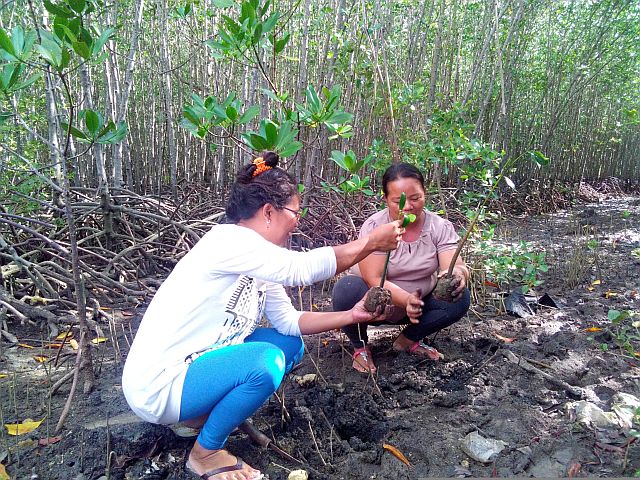
For Maricor Densing and members of the Bagasawe Farmers and Fishermen Association, safeguarding their place’s mangrove is not only imperative because it is a source of income but also because they believe that doing so contributes to a better future for their children. (CONTRIBUTED PHOTO)
In the midwest Cebu town of Tuburan, the Bagasawe Farmers and Fishermen Association (BFFA) is gaining reputation as the leading people’s organization (PO).
Established in 1992 by groups of farmers and fishermen, the association plants and monitors mangroves under the supervision of the Department of Environment and Natural Resources (DENR) and with the support of private companies like business process outsourcing.
The BFFA is the lead group in the 22-hectare mangrove plantation project in Bagasawe.
Maricor Densing, association president, said their group continues to thrive because of its members who are dedicated to the conservation of marine resources.
“Mangroves serve as wind breakers. They protect us against the storms. They serve as nurseries for fish,” the 37-year-old mother said.
The BFFA has more than 100 members, majority of whom are housewives.
Densing said they earn P15 from every propagule they plant.
She said they regularly conduct monitoring to ensure the survival of the mangroves because they are only paid for the mangrove propagules that survive.
On good times, each member could receive more than P10,000 for every planting project.
The members receive the money after six months.
Densing said the amount could even pay for the school tuition of her children.
Densing lives in a reclaimed area of the coast near the mangrove plantation.
“The mangrove forest was our protector during typhoon Yolanda in November 2013. We chose not to evacuate because we believed that the mangroves would protect us from the big waves,” Densing said.
She said it was Plan International, a nongovernment organization, that introduced them in the 1990s to mangrove planting.
Since then, they were able to plant more than 18,000 mangrove propagules with the help of the youth.
“I could still remember a staff of the organization who told me that sooner, the mangroves would be of great help to us, especially in our livelihood,” she said.
True enough, the mangroves now have provided the association income. The association also sells propagules for P2 each to agencies and organizations, including the Ramon Aboitiz Foundation Inc. for its Run2Plant tree planting activity.
“Some people’s organizations that have visited our mangrove plantation often asked us how we manage our mangroves. Some POs, like those from the towns of Bantayan in Bantayan Island, San Remigio and Medellin, order propagules from us.
“The POs look up to us because of our efforts,” she said.
It was not always smooth sailing for the group. There were moments in the past when the members’ interest waned, and they thought the association would cease to exist.
She said they reminded the members to continue what they were doing not just for themselves but for their community and for their children’s future.
“We see this association as our financial backer. We don’t see it as a burden but rather as our way of helping the DENR and our barangay,” Densing said.
She said mangrove planting is also an avenue for them to bond with their families because their children as young as four years old also participate.
The children, she said, enjoyed planting the mangroves that they even asked the association on the next planting schedule.
Densing said that the children are now getting excited to join the mangrove planting, especially when they have no classes.
“They could be the next frontliners of this initiative that we’ve started. I hope they will continue this practice,” she said.
She acknowledged that making people understand the core purpose of coastal conservation is very challenging.
“You can’t please everyone. So we, as officials, need to be strong in our stand that when someone cuts our mangroves, we need to impose necessary actions under the law….We have more than 100 wardens who guard the plantation,” she said.
Her father was also an official of the organization a decade ago, and he passed on that “legacy” to her. Growing up, she saw how passionate her father was in the initiative. When called to be the group’s next president, she responded positively without any hesitation.
Densing is also a barangay health worker and a volunteer for the Pantawid Pamilyang Pilipino Program (4Ps) of the Department of Social Welfare and Development.